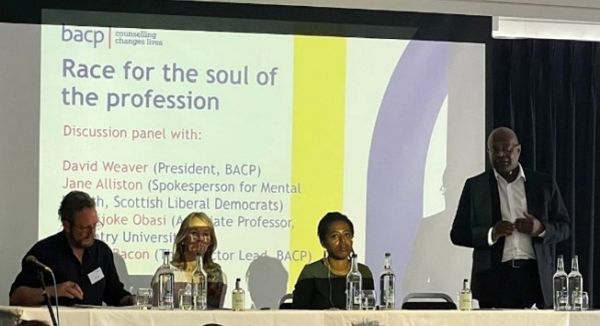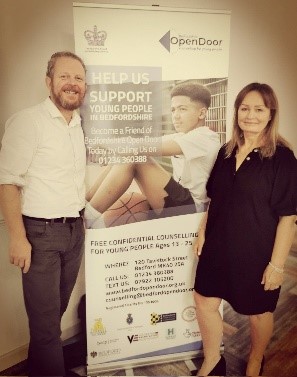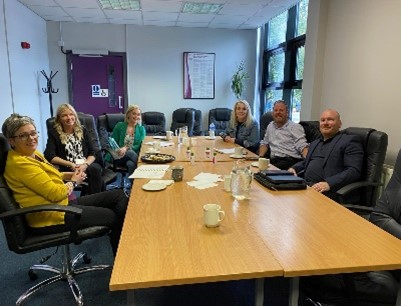Engaging with members
Pilot grant scheme
The two projects being delivered by BACP organisational members with funding from our pilot grant scheme are now up and running. Children North East, based in Newcastle-Upon-Tyne, has produced a literature review and begun engaging with young people from refugee and asylum-seeking backgrounds as part of its project to remove barriers to therapy.
The Metanoia Institute is working in partnership with Autus and 3DNovation to develop and implement use of avatar technology to improve access to therapy for autistic people from racialised community backgrounds. An external evaluation partner (Wavehill) has been appointed and is working with both project teams to capture knowledge and learning from their work.
Research Conference and paper launch
In May we launched the policy paper, Race for the Soul of the Profession, at the BACP Research Conference in Dundee. With a foreword by our President David Weaver, the paper sets out the complex and wide-ranging racial disparities evident in the counselling professions. It also lays out the action required to begin to address these to improve racial equity in the counselling workforce and in access to therapy for people from marginalised and racialised community backgrounds. Our Third Sector Lead, Jeremy Bacon, joined Scottish Liberal Democrat Jane Alliston and Dr Chijioke Obasi from Coventry University in a panel session, hosted by David, to discuss the paper, its recommendations and its implications.

Queen's Award
In June BACP accredited service Bedford Open Door received the Queen's Award for Volunteering for its work with children and young people. Speakers at the presentation event included funders and fundraisers, clinical lead and supervisors, and young people who have used the service and testified to its life-changing impact. The event provided an opportunity to establish links with the service, and to meet members delivering therapy who were interested in sharing their experiences and insights in support of our policy work.

Making connections with Disability Action
In July, the policy team attended our Making Connections event in Belfast where we met with key staff from organisational member Disability Action. It has recently extended its work to include a pilot counselling service for older disabled people and demand for the service has been high. The organisation is planning to extend its counselling offer to develop a service that can offer student placements. Following the meeting, we've established links between Disability Action and other disability counselling organisations through our Workforce Lead.

Organisational member services
As part of our third sector strategy, and in response to last year’s organisational membership survey, we've launched a new e-bulletin which was sent to all organisational members in June and will now be issued quarterly.
We also had a good response from organisational members to our first third sector event, which targeted leaders from voluntary, community and social enterprise (VCSE) counselling services. Over 100 people attended the event in October which covered a range of issues consistently raised by members – unpaid work, relationships with the NHS, and diversity in counselling training and workforce.
Engaging with elected representatives
Mental health plan consultation
In June we launched a campaign to ask members in England to endorse our response to the UK Government’s 10-year mental health plan consultation. This was signed by 11,007 members – more than one in five of our members in England.
In July we submitted our response to the consultation, in which we strongly urge the Government to consider our five key asks. We believe these asks will help to steer the nation through increasingly challenging times:
- Expand the counselling and psychotherapy workforce within the NHS and explore new opportunities for service delivery through integrated care systems.
- Invest in a trained and professional counsellor in every secondary school, college and community hub in England.
- Provide access to high quality and culturally sensitive services to people from marginalised community backgrounds and those at greatest risk of psychological distress.
- Increase workplace counselling support to help people deal with the personal, financial and work pressures which often lead to poor mental health, as well as enhancing support for those returning to work, preparing for retirement or seeking employment.
- Improve access and choice of therapy through investment in local community-based counselling services.
In early September we wrote to the new Prime Minister, Liz Truss, and called on her to retain existing plans for a 10-year mental health strategy to ensure that investment is sustainable and better uses the skills and capacity of the existing counselling professions.
Meeting with the NI Education Minister
Our CYPF Lead, Jo Holmes, supported by Caryl Sibbett (MBACP), met with the Northern Ireland Education Minister at Stormont in August to discuss the future direction of the Healthy Happy Minds Programme. The programme, funded until the end of December, provides primary schools with additional money to buy in a range of counselling services.
Jo and Caryl discussed the need for continued funding, as well as issues around workforce, training, professional standards and evaluation. Caryl represented the British Association of Art Therapists and shared valuable insight into issues affecting members in both professional bodies. The meeting came about after a joint letter was sent to the Minister highlighting the need for transition funding to be in place after the summer holidays.
Refugee Week
We worked with colleagues in our comms team to prepare and share a series of blogs to mark Refugee Week 2022, for which the theme was ‘Healing’. This gave us an opportunity to update members on our policy work on this critical topic. Amna, an organisational member, also shared details of its work with trauma among refugee communities and those who provide support to refugees.
As the Ukraine conflict continues, and over 20,000 refugees from the evacuation of Afghanistan remain in temporary accommodation in the UK, we continue to call for the provision of trauma-informed and culturally sensitive psychological support for refugees. This includes supporting the development of a research proposal with Barnardo’s in Northern Ireland and Ulster University. We're also working with our grant funded project, Children North East, on its literature review in preparation for publication in a research journal.
Employer engagement
We met with representatives from several priority industries in the public and private sector, to promote the value of counselling and help employers navigate these increasingly complex and often volatile times.
The past two years have been incredibly turbulent, as we’ve faced Covid, racial violence, political upheaval, environmental disasters, war and more. Anxiety and depression have increased in workplaces across the UK and reports of burnout are becoming common among workers. Organisations have had to confront issues they never expected, including filling gaps in skills and capacity, while finding new ways to support their employees through repeated traumatic experiences.
Alongside representatives of MIND, digital mental health provider Kooth and the West Midlands Ambulance Service (WMAS), we took part in a panel discussion exploring burnout in key workers, advocating for the positive impact specialised, trauma informed, workplace counsellors can play in helping those experiencing burnout.
We also met with senior leaders at CABA, an organisation working on behalf of members in the financial accounting profession, to explore how counselling might best be employed to support their members. In addition we've continued our work with the Royal Foundation, working closely with PoliceCareUK to develop a network of trauma informed emergency responder therapists. And we've submitted evidence to support the parliamentary rural mental health committee, building on our work to promote the value of counselling for rural workers.
Over the summer our work with employers helped directly create 30 new paid counselling roles, promoted dozens more to our members and helped leverage almost £1m in additional payment and benefits for existing EAP affiliate counsellors.
NICE guideline for depression in adults
A ‘significantly improved’ NICE Guideline for depression in adults has been published – after five years of consultations and campaigns. The guideline's recommendations have a direct impact on the treatments offered for depression and whether counselling and psychotherapy is made available to people. We’ve long campaigned, alongside our members, other mental health organisations and MPs, for the guideline to be updated.
We responded to the latest consultation on the guideline in January, drawing on feedback from counselling and psychotherapy academic researchers and from members.
We believe the updated guideline is substantially better than both the previous 2009 version and the first draft of this update in 2017, which was not fit for purpose. It now places greater emphasis on client choice when accessing services and includes the recommendation that all psychological therapies should be considered as first line treatments for depression. However, we believe there are still some areas which need to improve. We’re still disappointed that our concerns about how some relevant research was not considered have not been addressed by NICE.
Moving forward we'll continue to lobby for changes to NICE but are likely to refocus our campaigning away from a single guideline and more towards the broader methodological changes we want to see. This would produce more appropriate guidelines, particularly where psychological therapies are recommended.
Four nations view
Northern Ireland
Despite the ongoing political uncertainty in Northern Ireland, we're continuing to make a strong case for further investment in counselling and psychotherapy.
In June we met with representatives from the Department for Health who are leading on implementing the new Mental Health Strategy, with partners Disability Action Northern Ireland. We used this meeting to press officials on ensuring that all facets of the counselling sector are fully represented in activities being formulated to drive forward implementation. We also highlighted the concerns we heard from members at our Making Connections event in Belfast in June, regarding sustainability of funding of counselling provision during the ongoing political turmoil.
In the autumn we're attending a dedicated event on the Mental Health Implementation Plan, with our partners at the Northern Ireland Counselling Forum and stakeholders across Northern Ireland.
Scotland
A big focus of our work over the summer has been responding to the consultation on the 10 year Mental Health and Wellbeing Strategy, which closed on 9 September. Since the consultation was launched in June, we've been talking to services and individual counsellors and psychotherapists working directly in schools, colleges, universities and across health settings to help us better understand the challenges they're facing. We've also met with partners, including SAMH, Colleges Scotland, Universities Scotland, HUCS Scotland and others across the wider mental health sector, to identify shared positions for our consultation response.
Wales
In the autumn we're attending workshops led by Health Education and Improvement Wales and Social Care Wales to inform the development of a new Mental Health Workforce Plan, a key commitment within the Welsh Government’s Together for Mental Health Delivery Plan 2019-22. This is an important opportunity to ensure that counselling and psychotherapy are fully represented within the emerging plan as part of their ongoing consultation.
You can find out more on the NHS Wales website.
Devolved England
We're increasing our visibility and engagement with the emerging Integrated Care Systems (ICSs) through membership of the Health Devolution Commission, a cross party campaign group made up of six former Health Ministers. In June our President, David Weaver, gave verbal evidence to a session on the role of ICSs in addressing mental health need. He highlighted concerns from a number of third sector counselling providers across England about the challenges they've faced in engaging with ICSs.
Read the June 2022 Roundtable Briefing paper
For further information about any of the articles in this issue, or to speak to our Policy team, please email publicaffairs@bacp.co.uk
